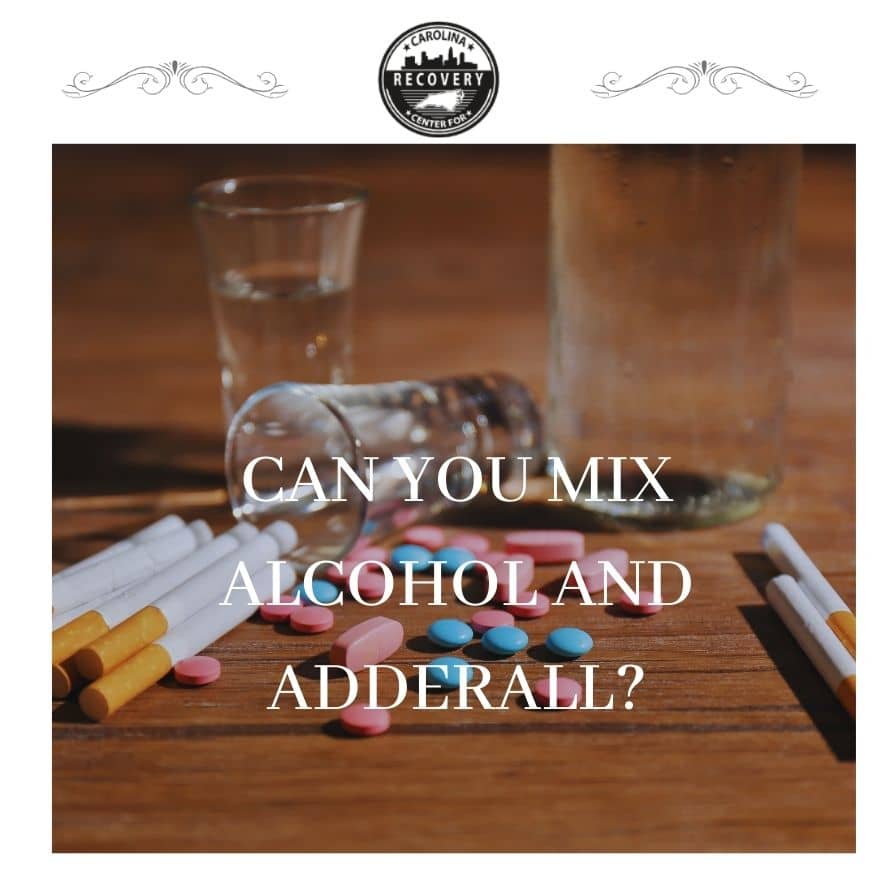Can You Mix Alcohol and Adderall?

Medically Verified: 2/1/24
Medical Reviewer
Chief Editor

All of the information on this page has been reviewed and verified by a certified addiction professional.
Misusing prescription drugs like Adderall or drinking too much alcohol can harm your mental and physical health. But what are the risks of mixing alcohol and Adderall?
It can be dangerous to mix two substances–even when one is a prescription medication. Whether you take Adderall with a prescription or use it recreationally, there are significant risks associated with mixing these two substances.
This article will explore the potential danger of mixing alcohol and Adderall. If you or someone you love requires treatment to stop using drugs and alcohol, reach out to the Carolina Center for Recovery staff today to explore our comprehensive programs.
What is Adderall?
Adderall is a prescription medication that contains a combination of amphetamine and dextroamphetamine. Doctors prescribe Adderall to help people manage several medical conditions, including attention-deficit hyperactivity disorder (ADHD) and narcolepsy.
Adderall works by stimulating the central nervous system (CNS). While it may sound counterintuitive, more activity in the CNS can help people with ADHD and other attention think and focus more easily.
People should only take Adderall if their doctor prescribes it because it has the risk of misuse and dependence. However, many people take Adderall recreationally–meaning without a prescription–for its stimulant effects. People may take Adderall to improve focus while studying or to have more energy and endurance in sports or other activities.
Adderall is a Schedule II substance, meaning it poses a significant risk for abuse that may lead to physical or psychological dependence.
How Does Alcohol Affect Your Body?
Having too much alcohol can harm your health. Alcohol affects all systems of your body.
Brain
Alcohol disrupts communication pathways in the brain and causes structural changes that prevent the brain from functioning normally. People with alcohol-induced brain damage struggle with movement, balance, and cognition.
Heart
Alcohol impacts your heart’s health. Heavy drinking over a long period can damage your heart, leading to stroke, high blood pressure, irregular heartbeat, and cardiomyopathy.
Liver
Excessive drinking can damage and inflame your liver, keeping it from functioning the way it should. People may develop fibrosis, cirrhosis, alcoholic hepatitis, or fatty liver as a result of heavy, prolonged alcohol abuse.
Cancer
Heavy alcohol use is linked to a greater risk for certain types of cancer, including breast, colorectal, head and neck, esophageal, and liver cancers.
Immune system
If you drink too much, your body’s immune system may be unable to protect you from diseases like pneumonia or tuberculosis. Even just a single occasion of drinking can suppress your immune system for a full day.
Drinking can also lead to impaired judgment, poor coordination, aggressive behaviors, and other negative outcomes. Being intoxicated makes it more likely that someone will be involved in a violent incident, be the victim or perpetrator of a crime, drown, be involved in a motor vehicle accident, or harm themself accidentally. Intoxicated people are also more likely to engage in risky sexual behaviors or be the victim of sexual assault.
Understanding the Dangers of Mixing Alcohol and Adderall
Polysubstance abuse–using two or more substances simultaneously or within a short time of each other–can be very dangerous. Substances often interact with each other, and it can be nearly impossible to predict how a person will be affected.
Using multiple substances is potentially hazardous, even when one of the substances is a prescription medication, as its effects may be stronger when used recreationally. It’s common for people to develop tolerance to medications they take recreationally, meaning they may take higher doses than a doctor would typically prescribe.
Some of the potential physical health risks of mixing alcohol and Adderall include:
- Heart failure
- Respiratory infections
- Kidney failure
- Overheating
- Dehydration
- Cardiovascular damage
Mixing alcohol and Adderall may also increase the risk of behavioral problems, including:
- Being injured
- Unsafe or risky sexual behaviors
- Engaging in potentially-dangerous activities like driving or swimming while intoxicated
- Worsening or new mental health symptoms
- Interpersonal issues
Non-prescription Adderall use is most common among college students, and studies have found that 46.4% of undergraduate students who abused Adderall used alcohol simultaneously in the year prior to being surveyed.
People who use Adderall and alcohol may be more likely to develop dependence or addiction to these substances. Those mixing alcohol and Adderall who have an ADHD diagnosis may also be at increased risk of:
- Suicidal thoughts and behaviors
- Early addiction
- Impulsivity
- Hospitalization
- Severe, complex addictions
People living with both addiction and ADHD may face an increased risk of co-occurring mental health conditions, including:
- Depression
- Conduct disorder
- Bipolar disorder
- Anxiety
- Personality disorder
People with polysubstance abuse must seek comprehensive treatment to safely stop using Adderall and alcohol and learn the skills they need to avoid relapse for life.
Find Help Now
If you or someone you love is mixing alcohol and Adderall, don’t wait another day to seek treatment. Polysubstance abuse is dangerous and can lead to serious, even life-threatening, complications and harm. Don’t risk your health and safety. The compassionate, comprehensive treatment you need is just a phone call away.
The Carolina Center for Recovery admission counselors will help you find the treatment program to help you stop using substances safely. You’ll get the support and learn the skills you need to live the healthy, fulfilling lifestyle you deserve. Call today to get started.
References:

